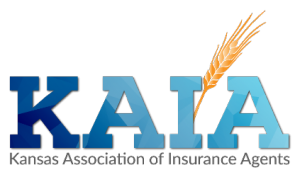What Kansas Insurance Agents Can Expect during the 2021 Legislative Session
The Kansas Legislature convenes for its 2021 regular session on Monday, January 11. The 2021 edition of the legislature will look different than last year, particularly in the wake of the COVID-19 landscape. Exactly how the legislature navigates the business of running this session is not clear and will be tested depending upon the pandemic's status. Also, all 125 House seats and 40 Senate seats were up for reelection this past year. With retirements and incumbent election losses, the legislature saw over 25% turnover. New legislative leaders, committee chairs, and committee make-up will impact the handling of matters, including those issues affecting your agency.
In addition to many new faces in the statehouse, the Republican grip in the House became more conservative in both chambers. Republicans hold a supermajority in the House and Senate, which provides enough votes to override any veto made by Democrat Governor Laura Kelly. In year three of Governor Kelly’s first term, she has become familiar with working with a Republican-controlled legislature. The Governor will need to lean on this experience to achieve some of the administration’s policy goals. Otherwise, Kelly will need strong bipartisan support to sustain any veto she makes.
The legislative response to COVID-19 is at the front and center of the 2021 Session. To date, some of Governor Kelly's methods and recommendations dealing with the pandemic have been met with an icy reception by Republicans in the statehouse. With many of the COVID-related provisions, such as health care provider and business liability protections, set to expire on January 26, Kelly's administration will be challenged in securing continued executive authorities unless a compromise with Republican leaders is made. In addition to COVID policy, the legislature will face several challenging pieces of legislation, including legislative redistricting, budget adjustments, tax and legal reform, and resolutions to amend the Kansas Constitution on matters related to abortion and judicial selection.
Legislative Issues Impacting Your Agency and Clients
KID Producer Licensure Bill. In 2020, the Kansas Insurance Department (KID) introduced SB402, which would have updated producer licensing statutes pertaining to appointment, fees, licensing, renewal dates, continuing education, suspension, revocation, and licensure denial reinstatement. These changes would modernize the licensing process bringing the efficiency of utilizing the NIPR licensing platform. After much discussion and negotiation with KID, the KAIA was neutral on SB402.
The Department is bringing similar legislation again in 2021. And after further negotiations, the KAIA Government Affairs Committee voted to support the new legislation. Highlights of the bill are as follows:
- Bill would require a resident agent and business entity to submit a renewal application to the Insurance Commissioner and pay a biennial renewal application fee of $4. The bill would change the definition of the biennial due date to the last day of the birth month of an agent and the last day of the month of the initial licensure for a business. This is not a change from SB402. KAIA spent much time negotiating the fees involved with the agency and agent renewal process, and the KID agreed to reduce the fees to an amount of $4. This was an extremely large reduction compared to the KID's initial proposal.
- The bill would increase the number of continuing education credit hours required for biennial license renewal from 12 to 18 for agents qualified for any combination of the following lines of authority: life, health, property, casualty, accident, and personal. So, while single lines agents will see a 6-hour increase in CE requirements, dual-licensed agents will realize a 6-hour reduction. Approximately 55% of Kansas agents are dual licensed and will see a decrease in CE hours required. SB402 originally proposed increasing the CE requirements from 12 to 24, which is the NAIC’s suggested national standard. KAIA pushed back hard on the 24 hours. The KID's willingness to reduce the bills CE requirements to 18 - critical in garnering KAIA support.
- Of the education credits, the bill would increase insurance ethics hours from one to three hours. KAIA also worked with KID to remove the cap limiting agency management related education to six hours. The remaining 15 hours can be general continuing credits without regard to the content topic.
- The bill will remove the automatic appointment of affiliated agents for companies. If adopted, only individual agents and not agencies will be appointed by companies.
- Eliminate the current statutory requirement of waiting six months before taking the licensing exam if failed three times in a row. This is new language KAIA worked to secure.
- Eliminate the current statutory requirement that self-study CE have a proctored exam. This is new language KAIA worked to include.
- Eliminate the current statutory requirement that if an agent moves license to inactive status, must wait two years before applying to have it reactivated. This is new language that was not in SB402.
After months of negotiations and significant changes to the Insurance Department's original legislative language, the KAIA Government Affairs Committee voted to support the new licensing bill. KAIA efforts helped to eliminate over $210,000 in bi-annual fee increases for our members. Through intense negotiations, members were spared nearly $330,000 in increased, bi-annual CE expenses in working with the insurance department to limit the CE increase to 18 instead of the national standard of 24 hours.
On average, this translates to an estimated combined average annual savings of $830 per member agency from what was initially proposed. KAIA fought to ensure the final version of the new producer licensure bill was balanced and, as a whole, providing benefit to most agents and brokers.
Administrative Subpoena Authority for KID. In 2020, the Department introduced SB291, which would have allowed the Insurance Commissioner to make investigations and examinations regarding the insurance code. The Commissioner could appoint investigators to conduct anti-fraud investigations, subpoena witnesses, and compel them to testify, require documents, and order depositions. The bill describes actions that could be taken if a person refuses to obey a subpoena or refuses to testify, including a civil penalty of up to $2,000 for each violation.
SB291 contained provisions that would have created "insurance and special investigators" trained as police officers. These investigators would have had the authority to make arrests, serve subpoenas, conduct searches and seizures, store evidence, and carry firearms while conducting anti-fraud investigations. Due to this provision, KAIA opposed SB291, and the new bill will not include the law enforcement provision. KAIA will be neutral on the new bill.

Photo by Anna Shvets from Pexels
COVID-19 Liability Protections. In the 2020 Special Session, large bipartisan majorities in the House and Senate passed out HB2016, which created and amended law regarding the governmental response to the coronavirus pandemic in Kansas. The bill's main provisions impact the expenditure of federal stimulus dollars, the Governor's executive authority relating to emergency declarations, and COVID-related liability protections for healthcare providers and businesses. These liability protections are to expire on January 26, 2021, unless the legislature acts. We anticipate the legislature's first order of business will be to renew many of the provisions in HB2016. Important for the insurance market were the following provisions:
- Healthcare Provider Immunity. The bill states that a healthcare provider is immune from civil liability for damages, administrative fines, or penalties for acts, omissions, healthcare decisions, or the rendering or failure to render healthcare services. It includes altered, delayed, or withheld services as a direct response to any COVID-19 state of disaster emergency under the KEMA. The immunity would not apply to cases of gross negligence or willful, wanton, or reckless conduct. Nor would the immunity extend to services not related to COVID-19 that were not altered or delayed.
- Business Liability. The bill states that a person conducting business in Kansas shall be immune from liability in a civil action for a COVID-19 claim if such person was acting pursuant to and in substantial compliance with public health directives applicable to the activity giving rise to the cause of action when the cause of action accrued. This section would expire on January 26, 2021, and the bill would state this provision would apply retroactively to any cause of action accruing on or after March 12, 2020. One crucial piece of this immunity was the broad definition of "business," which included public entities such as schools.
- Product Liability. The bill states that a person who designs, manufactures, labels, sells, distributes, provides, or donates a qualified product in response to the COVID-19 public health emergency shall be immune from liability in a civil action that alleging a product liability claim involving any of the above actions taken at the specific request of or in response to a written order, or other directives, finding a public need for a qualified product, issued by the Governor, Adjutant General, or Division of Emergency Management. The damages are not occasioned by willful, wanton, or reckless disregard of a known, substantial, and unnecessary risk that the product would cause serious injury to others. The bill would state this provision would apply retroactively to any cause of action accruing on or after March 12, 2020.

Photo by Andrea Piacquadio from Pexels
Workers Compensation. In the wake of the pandemic, efforts have been made to make Coronavirus compensable in the workers' compensation system (WC). While WC laws provide compensation for “occupational diseases” that arise out of and in the course of employment, many state statutes, including Kansas, exclude “ordinary diseases of life” (e.g., the common cold or flu). States are taking action to extend WC coverage to include first responders and health care workers impacted by COVID-19. Governor Kelly issued a temporary Executive Order extending coverage to this group. Other states, however, are enacting permanent and broader application of coverage. A common approach is to amend state policy so that COVID-19 infections in certain workers are presumed to be work-related and covered under workers' compensation. This presumption places the burden on the employer and insurer to prove that the infection was not work-related, making it easier for those workers to file successful claims. These presumption policies will increase insurance costs for employers when businesses are already facing significant financial challenges. KAIA will fight against any attempt to extend workers' compensation coverage of COVID-19
Legal Reform. As you will recall, the Kansas Supreme Court struck down the statutory cap on non-economic damages in personal injury cases. In its decision on Hilburn v. Enerpipe, a trucking accident case, the Court ruled that the cap violates the right to trial by jury in Section 5 of the Kansas Constitution Bill of Rights. The business community, including the KAIA, actively considered potential legislative remedies to the Hilburn decision. However, no straightforward statutory fix has surfaced, and many have resisted pursuing a state constitutional amendment. Instead of a direct fix, the business community has worked on legislation to make the pursuit of lawsuits less enticing for plaintiffs’ attorneys. Look for legislation in the 2021 Session that will include A) a cap on attorneys' fees; B) additional limitations and notification requirements on attorneys' advertisements; and C) a prohibition on third-party funded lawsuits.
Increasing MVR Cost. Effective November 1, 2020, the fee to get MVRs in Kansas increased by about 20%, from $13.70 to $16.70. With the November 1 change, and based on MVR record fees by the state as of February 1, 2020, Kansas has the eighth highest MVR fee in the country. Many agencies are incurring substantial expenses for purchasing MVRs necessary in the customer quoting process. KAIA is investigating the genesis of this MVR increase and why this cost is so high compared to other states. We'd like to know where this money is going, and the process for authorizing fee increases.
Protecting KAIA Members
It will be very interesting to see how the 2021 legislative session unfolds. Please feel assured that your KAIA team is working diligently to protect our members' interests from harmful legislation so that you can continue to do what you do best, helping protect what's important to your communities.
This article originally appeared in the November/December 2020 edition of KIA&B magazine.
KAIA Government Affairs
During the legislative session, KAIA provides weekly updates to House and Senate bills
Support Your PAC
Invest in the future of independent insurance agents by contributing to InsurPac.
